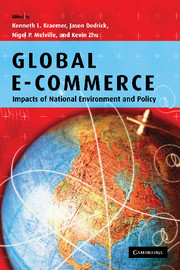Book contents
- Frontmatter
- Contents
- List of figures
- List of tables
- List of boxes
- Notes on contributors
- Introduction
- 1 Globalization and national diversity: e-commerce diffusion and impacts across nations
- 2 The United States: adaptive integration versus the Silicon Valley model
- 3 France: an alternative path to Internet-based e-commerce
- 4 Germany: a “fast follower” of e-commerce technologies and practices
- 5 Japan: local innovation and diversity in e-commerce
- 6 China: overcoming institutional barriers to e-commerce
- 7 Taiwan: diffusion and impacts of the Internet and e-commerce in a hybrid economy
- 8 Brazil: e-commerce shaped by local forces
- 9 Mexico: global engagement driving e-commerce adoption and impacts
- 10 Global convergence and local divergence in e-commerce: cross-country analyses
- APPENDICES
- Index
8 - Brazil: e-commerce shaped by local forces
Published online by Cambridge University Press: 24 October 2009
- Frontmatter
- Contents
- List of figures
- List of tables
- List of boxes
- Notes on contributors
- Introduction
- 1 Globalization and national diversity: e-commerce diffusion and impacts across nations
- 2 The United States: adaptive integration versus the Silicon Valley model
- 3 France: an alternative path to Internet-based e-commerce
- 4 Germany: a “fast follower” of e-commerce technologies and practices
- 5 Japan: local innovation and diversity in e-commerce
- 6 China: overcoming institutional barriers to e-commerce
- 7 Taiwan: diffusion and impacts of the Internet and e-commerce in a hybrid economy
- 8 Brazil: e-commerce shaped by local forces
- 9 Mexico: global engagement driving e-commerce adoption and impacts
- 10 Global convergence and local divergence in e-commerce: cross-country analyses
- APPENDICES
- Index
Summary
Introduction
Brazil presents an interesting case study of local factors influencing the adoption and impacts of e-commerce. Globalization is typically associated with the adoption of innovative technologies such as e-commerce that facilitate expansion into international markets and management of cross-border transactions. In the case of Brazil, however, its large size and considerable geographic distance from global production networks create a relatively inward-oriented economy. Other factors besides globalization have thus driven e-commerce. These include the need for financial efficiency driven by historically rampant inflation, as well as low GDP per capita typical of developing economies. Moreover, severely disproportionate wealth distribution impedes widespread adoption of certain forms of e-commerce. The overall result is the importance of local forces relative to global forces in driving e-commerce, the leadership of the financial sector in ecommerce adoption, and the innovation of large firms relative to small firms in the use of the technology.
Less international orientation. On average, firms in Brazil are less internationally oriented than those in other economies. Only 4% of firms in the sample have establishments abroad, versus 24% in the global sample. Sales from abroad are less than a third of firms in other economies (4% versus 12%), and procurement from foreign firms is less than one half (10% versus 20%).
Local forces key. Local forces are more important than global forces in driving e-commerce diffusion. Reasons include Brazil's inward orientation, its large domestic economy, and its unique economic history and government policies.
- Type
- Chapter
- Information
- Global e-commerceImpacts of National Environment and Policy, pp. 278 - 305Publisher: Cambridge University PressPrint publication year: 2006



